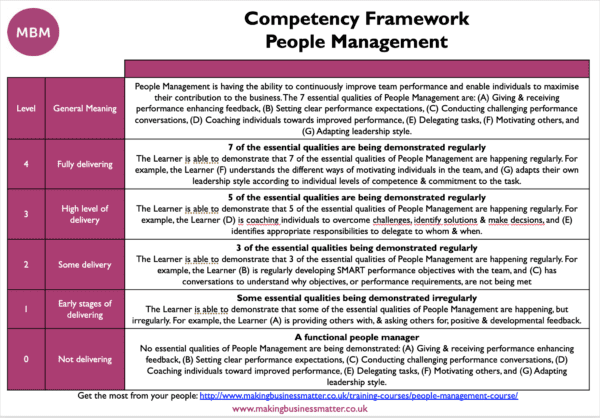Management Training Courses
As management trainers, we are often asked what is the best course to improve people management skills. In this article, you can find out all about management training courses. In addition, you will find answers to the most common questions, including which is the best training course for managers.
1. What Are the Best Management Courses?
According to Career Addict the best 8 training management courses in the world are:
- Master of Business Administration (MBA).
- Project Management Professional (PMP).
- Chartered Management Institute (CMI).
- Institute of Leadership and Management (ILM).
- Certified Management Consultant (CMC).
- Master in Management (MIM).
- Commissioning Course – Royal Military Academy, Sandhurst (RMAS).
- Internal Company Training Programmes.

We understand qualifications are important and an MBA from Harvard is not to be sniffed at.
Here at MBM, the last 18 years of working as management trainers have taught us that any training course is only as good as the behaviours it changes. This means that by all means take a course with the big names, but just remember that when you are leading a team would you rather have a certificate/qualification, or know how to do it, have practised it, and be able to easily show those behaviours? If it’s the latter, take a look at our managers’ training course.
2. What Kind of Training/Qualifications Do Managers Need?
A degree is often required in order to become a manager of people and have a level of experience. Most people do a job and show that they can do it successfully, and then subsequently gain promotion. The risk is that a person who is competent in doing their job is not necessarily competent at managing people. This is known as the ‘Peter Principle‘.
Wikipedia defines this as:
The Peter Principle is a concept in management developed by Laurence J. Peter. It observes that people in a hierarchy rise to their “level of incompetence”. Employees gain promotions based on their success in previous jobs until they reach a level at which they are no longer competent. This is due to the fact that skills in one job do not necessarily translate to another. The book, The Peter Principle (William Morrow and Company, 1969) by Dr Peter and Raymond Hull explains the concept in great detail.
Managers that have recently gained a promotion need to develop requisite skills through training to manage people. Not left to sink or swim.
3. What Are the 3 Types of Management?
People that manage people generally fall into one of three management styles; Autocratic, democratic and laissez-faire. Each style has its advantages and disadvantages.
Autocratic is a top-down approach where communication is one-way. Do this and do that. This style tends to be seen in the negative. For example, Napoleon, Hitler and Margaret Thatcher all adopted this style. The advantage of this style is that it can get a group of people to follow orders towards the leader’s goal.

Democratic is a management style where people have a say and can vote. Their opinion is heard. Abraham Lincoln was thought to be a Democratic leader, always listening to his colleagues and the people. However, the disadvantage is that this style of management can be slow and get lost in the debate.
Laissez-faire is a term for leaving things alone. Nelson Mandela led through this style. The advantage is that the people are left to ‘get on with it’. Yet, the disadvantage is that the people are left to ‘get on with it’. If people know what they are doing and are all pulling in the same direction, this style can be very productive. However, if they’re not, it is very counterproductive.
4. Is Management a Good Career?
The answer is that it depends. Not everyone is cut out to manage people. Many people that have gained promotions to become managers of people dislike it. They don’t like the responsibility and ‘people are difficult’ is a common phrase. The problem is that each member of a team has their own motivations, desires, ways of communicating, support needs, and so on. Not easy for anyone to manage.
The lure of managing people is the rewards. A better package tends to be given to those that manage teams and lead people. Unless you are a specialist with knowledge of a field/skill/science, the routes to better rewards are mostly through being given the responsibility to manage people.
5. What Are the Skills of a Manager?
The 7 essential qualities of People Management are:
- (A) Giving & receiving performance-enhancing feedback.
- (B) Setting clear performance expectations.
- (C) Conducting challenging performance conversations.
- (D) Coaching people toward improved performance.
- (E) Delegating tasks.
- (F) Motivating others.
- (G) Adapting leadership style.
These 7 essential qualities are shown in our competency frameworks. By downloading the competency framework you can assess your current skill of people management and also identify where you want to get to.

6. How Do I Develop My Management Skills?
Obviously, the first choice is a management training course. Just be prepared that the 70:20:10 principle of learning says that we need to learn formally – a specific managers training course. This is the 10%. We also need to learn through others. This. might be coaching and represents the 20%. Finally, the 70%, which is learning on the job, and getting regular feedback on our performance. Whilst it might be tempting to jump straight to the 70%, each of the 3 parts needs to be completed. Firstly, we gain the knowledge of how to do it formally, then we learn from others around us and lastly we do it.
7. Which Management Is Best?
Unfortunately, there is no one answer because great leaders have had many different styles. Though there are a few principles that will help you to be the best version of the people manager that you can be:
- Never ask anyone to do anything that you would not do yourself.
- Treat people as you want to be treated.
- Seek feedback regularly from your team.
- Lead by example.
- Publically praise people.
- Give feedback to your people often.
- Be transparent.
Improving Your Skills With Management Training Courses
Reflect on the good people managers that you have had. Also, reflect on the bad ones. Copy what the good ones did, and do the opposite that the bad ones did. Furthermore, accept that people management is not for everyone. It’s hard. It’s trying. But also very rewarding.
Our People Skills tips written by experienced management trainers will help you to begin your journey to becoming a great people manager. Plus, you can get in touch with our people management trainers by completing our contact form.




